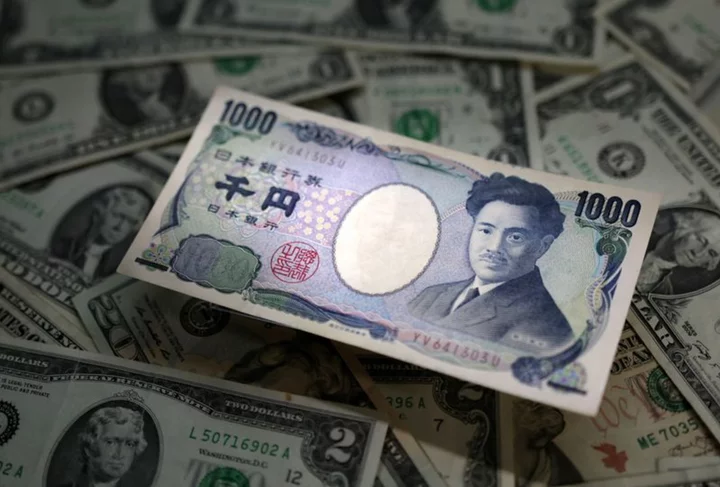By Vidya Ranganathan
SINGAPORE The U.S. dollar and most major currencies were flatlining in early trades on Monday, barring a blip in sterling, as a Japanese holiday and a bunch of upcoming central bank meetings sucked the air out of markets.
The Bank of Japan's policy meeting on Friday is the highlight of the week in Asia, after Governor Kazuo Ueda stoked speculation of an imminent move away from ultra-loose policy. In a week packed with central bank meetings, decisions are also due from the U.S. Federal Reserve on Wednesday and Bank of England on Thursday.
The yen was flat versus the greenback at 147.82 per dollar with markets in Japan closed for a national holiday. In the week since Ueda's remarks about a early move from negative rates, it has dropped 1.3% and taken losses for 2023 to more than 11%.
Carol Kong, economist and currency strategist at Commonwealth Bank of Australia, said she expects the yen to be volatile leading up to the policy meeting.
"In terms of the direction of travel, dollar/yen can definitely track higher," Kong said.
Investors may have potentially misinterpreted Ueda's comments. And the recent spell of weakness in Japanese wages and possibility prices too could soften and push the BOJ farther from its inflation goal, the case for a BOJ policy tightening is still not very strong, Kong said.
"So that means dollar yen can track higher, particularly if Governor Ueda sounds dovish and dashes hopes of policy tightening at the upcoming meeting," she said.
The dollar index was a tad lower at 105.23, with the euro up 0.11% at $1.0667. Sterling was last trading at $1.2397, up 0.06% on the day.
Most investors expect divergences in economic growth and in yields will keep the dollar propped up, particularly against the euro. Sterling has slid nearly 6% against the dollar since mid-July, while the euro has dropped more than 5% as the UK labour market and economy and the euro zone economy slowed.
The European Central Bank raised interest rates to 4% last week but said this hike could be its last.
With Japan shut, cash Treasuries were untraded on Monday.
U.S. Treasury yields have been edging higher, with the two-year above the 5% threshold and up 25 bps this month, spurred by rising government spending and the anticipation of the Fed keeping rates high for longer faces to rein in inflation that's still above target. Last week's U.S. retail sales data played a part, reducing the odds of recession even further.
Futures are pricing in just a 3% chance that the Fed raises interest rates at the end of its two-day meeting next Wednesday.
"With growth still strong and still tentative evidence the labor market and inflation are normalizing, officials are unlikely to be willing to send a signal that they are done raising rates," analysts at Deutsche Bank Research wrote.
The Bank of England is likely to hike interest rates once again this week, and markets are already looking for a pause in a massive tightening cycle that has policymakers worried about the cooling economy.
UK inflation figures for August are also due on Wednesday, just ahead of the meeting.
Meanwhile, oil prices are adding a layer of complication to central banks' growth-inflation dilemmas. Oil is also on track for its biggest quarterly increase since Russia's invasion of Ukraine in the first quarter of 2022.
Brent crude futures hit a 10-month high above $93 a barrel on Friday and posted a third weekly gain on supply tightness spearheaded by Saudi Arabian production cuts and some optimism around Chinese demand.
(Editing by Lincoln Feast)

